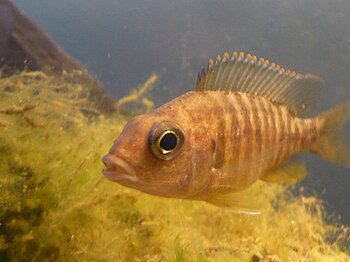 |
| Female Aulonocara sp. (Photo credit: Wikipedia) |
There have been ten different types of peacock cichlid identified so far, but it is thought that there are more yet to be discovered. The known types are Blue Peacock, Sunshine Peacock, African Butterfly Peacock, Auloncara Fort Maguire Peacock, Auloncara Blue Gold Peacock, Flavescent Peacock, Rubin Red Peacock, Baensch's Peacock, Maulana Bicolor Peacock, and Nkhomo Benga Peacock.
Peacock cichlids are freshwater fish that prefer to live in caves or rocky ridges that are below the water. You can keep these interesting fish at home as pets also. The aquarium requirements for them are as follows: A tank size of at least forty-five gallons with a lot of rocks that are placed in such a way as to form cave-like areas or cave decorations that they can go into. You should also use something to keep the water alkaline. Sand substrate is a good choice. This will also help with the breeding process.
They prefer their water to be alkaline and hard like the waters of Lake Malawi. The PH level should be between seven and a half and nine. You can also put some plants in your tank, but be sure that they are very sturdy plants that can withstand the hard water. The water temperature should stay around seventy-eight degrees Fahrenheit.
Peacock cichlids are omnivorous and therefore should be fed a diet of both meat and vegetables. They will readily eat pellet food, but also like bloodworms, mosquito larvae, snails, and crustaceans. Whenever new fry is born, they can be given fine flake food or brine shrimp that are freshly hatched.
Peacock cichlids are less aggressive and milder mannered than the other cichlid groups. They can be put in tanks together as well as with some other types of peaceful fish. The ratio of female to a male should be about two or three females to one male. These fish have an interesting way of breeding. They are classified as ovophile mouth breeders. This means that the entire process of breeding, from fertilization to incubation to hatching of the eggs will happen inside the female's mouth.
The male peacock cichlid fish will first dig a hole in the sand substrate. The female lays the eggs inside this hole. She will then take the eggs into her mouth where she will keep them for the next three or four weeks. She will not eat during this time period.
To learn more about cichlid fish, go to the Lifestyles100 website or pick up the Nook book, Cichlid Fish - The Wonderful World of Cichlid Care" at Barns and Noble. Article Source: EzineArticles |

No comments:
Post a Comment